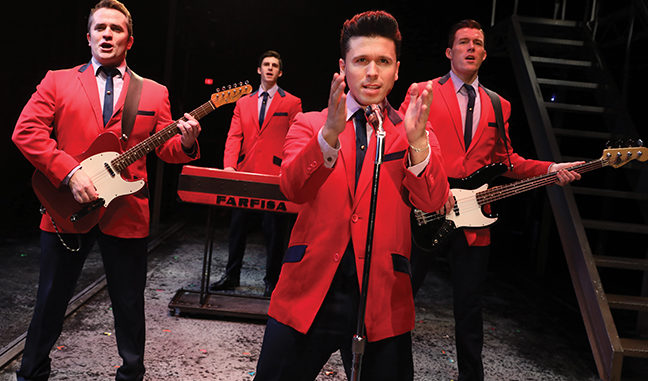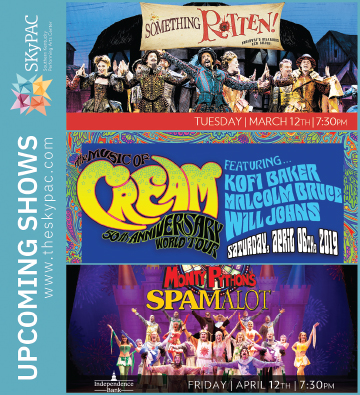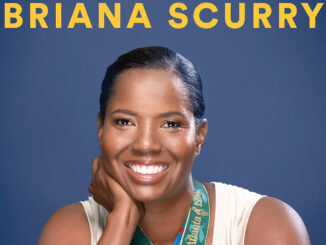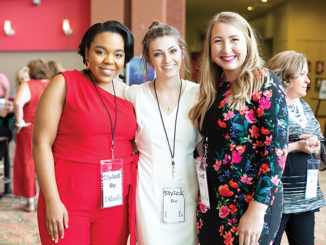
Forget about show-stopping finales. In Jersey Boys, the smash-hit musical about the rise and fall of The Four Seasons, the pinnacle of excitement comes about 45 minutes into the first act. That’s when back-to-back presentations of three of the group’s biggest hits – “Sherry,” “Big Girls Don’t Cry” and “Walk Like a Man” – are greeted with enough thunderous applause to start a downpour.
“At that moment the audience has forgotten they’re watching four actors and they root for these four guys as though they really are The Four Seasons in their youth,” said Rick Elice, one of the show’s book writers. “The response is so sincere and enthusiastic and over the top that it’s impossible to believe anything else.”
It’s also somewhat surprising. After all, The Four Seasons may have been one of the most successful groups of the 1960s, but history hasn’t institutionalized them the way it has the Beatles or other bands popular with that era’s counterculture. But Elice (pronounced “Ellis”) thinks that’s one reason why fans are so hungry for their music and the incredible story of four Italian-American kids from the wrong side of the tracks.
“In many ways the band was a reflection of the people who were buying their records,” Elice noted. “They didn’t have long hair or accents. There was no glamour quotient to them at all, which is why they were never written about. For fans of the band, the show is an edification of who they are, because the cultural establishment ignored them, too. These weren’t the people who went down to Washington and marched against the war; these were the guys who shipped out and went to Vietnam. And the respect that the band is getting all these years later somehow feels like respect for them, too.”
In fact, before working on Jersey Boys, The Four Seasons song that most resonated with Elice was “Can’t Take My Eyes Off You,” because characters in The Deer Hunter sing it just before they go to Vietnam. But he and his Oscar-winning co-author, screenwriter Marshall Brickman (Annie Hall), probably were more familiar with Vivaldi’s Four Seasons than pop music’s when they began work on the show, a first musical for them both. Des McAnuff, on the other hand, the Tony-winning director behind The Who’s Tommy, was a huge fan of the group (the first album he ever bought was a Four Seasons one), and he helped to shape the show from its early stages.
While other musicals have tried to capitalize on a group’s catalog of songs by integrating them into the plot, the writers agreed with McAnuff that their staging should be presentational, as if The Four Seasons were performing the songs to an audience, not singing them from one character to another.
“In the first act ,the songs are presented pretty much chronologically, as they took place within the life of the band,” said Elice, who prefers to describe Jersey Boys as a “play with music” instead of employing the much maligned “jukebox musical” moniker. “In the second act the music is more cunningly chosen to reflect either directly or by contrast what the band is going through at the point where things start to fall apart.” As members leave the group one by one, it’s to a medley of “Stay,” “Let’s Hang On (To What We’ve Got),” “Opus 17 (Don’t You Worry ’Bout Me)” and “Bye, Bye, Baby.”
Jersey Boys was born when Elice was contacted by a former client who had the option on The Four Seasons catalog. Elice had written a couple of plays and always wanted to work with Brickman. But as they interviewed the three surviving Seasons, they faced a predicament over how to tell the group’s “true” story when they couldn’t even figure out what it was.
Elice and Brickman met with Bob Gaudio and Frankie Valli, the two Seasons who, way back when, formed a business partnership with a handshake that still stands today. “They started to describe what it was like to be blue-collar kids, first-generation Americans, Roman Catholic, high school dropouts who were flirting with careers in crime in an environment where people had two pictures on the living room wall: the Pope and Frank Sinatra,” Elice said. “It was the archetypal American rags-to-riches story: You start with nothing, achieve success and then try to navigate your life through the waters of success.”
But when they contacted Tommy DeVito, the initial driving force behind the group until gambling debts put him on the outs with the mob, “He said, ‘Don’t listen to them, I’ll tell you what really happened,’” Elice recalled. That’s when they decided to structure the show the Rashomon way, by letting each character tell his own account. As Tommy says at the beginning of the show, “You ask four guys, you get four different versions.”
Jersey Boys comes to SKyPAC, May 2, 2019, at 7:30pm. Purchase your tickets today at www.theskypac.com or call the SKyPAC Ticket Office at 270.904.1880.
-by Diane Snyder
About the Author: Diane Snyder is a freelance journalist whose work has appeared in Time Out New York, The Wall Street Journal and American Theatre.




